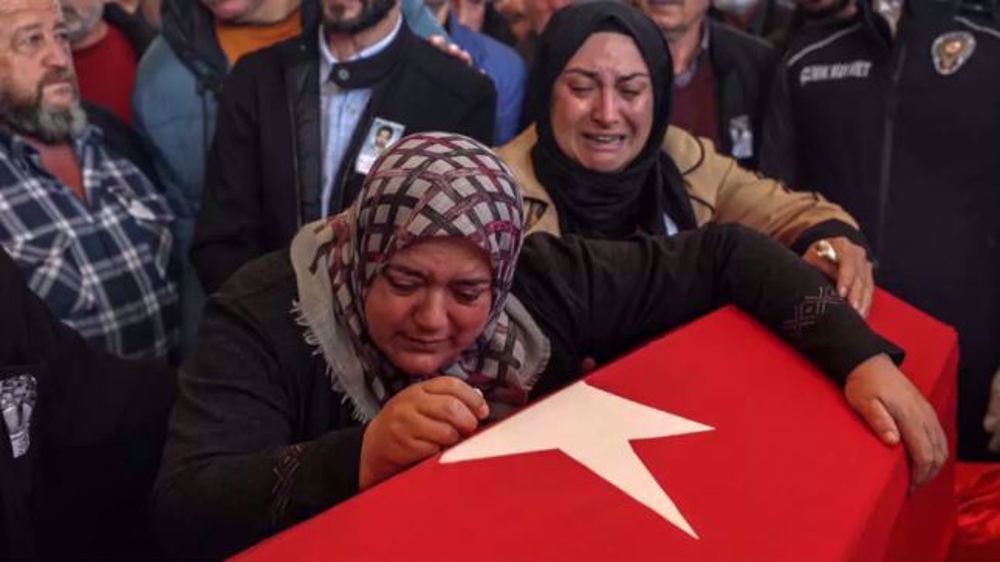Erdogan says EU needs Turkey for stronger regional, global presence
Turkish President Recep Tayyip Erdogan has renewed Ankara’s desire to join the European Union despite being rejected by the Western bloc several times in the past, insisting that the EU needs Turkey to be a strong global player.
“It is obvious that the Union cannot endure strongly, without the contribution and the support of our country,” Erdogan said in a message issued Sunday on the occasion of ‘Europe Day,’ adding, “Turkey, as a part of Europe in terms of historical, geographical and human aspects, is ready to do its part in the resolution of the problems that the European Union has faced, and increasing the effectiveness of the Union.”
The Turkish president, however, also censured the EU for not keeping its promises regarding Turkey’s accession process, pointing out that “some member states carried their bilateral problems with Turkey to the EU corridors and, hence, Turkey-European Union relations were captured and the Union’s capacity to fight against global challenges has weakened.”
“We wish that the European Union will demonstrate its ability to develop its relations with Turkey based on mutual respect and trust, with a strategic point of view and common sense,” he further said, noting that Ankara regarded EU membership as a “strategic goal.”
Boasting that his majority Muslim nation has been celebrating ‘Europe Day’ since the approval of its candidacy to EU membership in 1999, Erdogan further praised the bloc – notorious for its anti-Muslim attitude and policies -- for having made “significant contributions to the establishment of peace, stability and prosperity in our continent and beyond.”
“However, the Union has been recently facing numerous challenges such as the refugee crisis, Islamophobia and xenophobia, financial and fiscal fragilities, the withdrawal of the United Kingdom from the membership and the coronavirus pandemic,” he then underlined. “Overcoming these problems, that threaten the Union and its future, is dependent on solidarity, cooperation and regaining a brave and inclusive perspective.”
Erdogan also admitted to the “obstacles” his country faces in gaining EU membership, saying, “Turkey keeps its determined stance and efforts towards its strategic goal of European Union membership, despite the double standards and obstacles it faces. Turkey’s membership will pave the way for the rise of a Europe that is more effective at regional and global levels.”
The EU-Turkish accession talks have been discussed intermittently since 2005. They were revived in 2016 when the EU made a deal with Ankara to contain the influx of refugees and asylum seekers to Europe in return for cash and concessions which soon developed into a standstill.
Refugee deal and positive dialogue
In a separate statement, the Turkish deputy foreign minister responsible for EU affairs, Faruk Kaymakci, further emphasized that Ankara also desires an update of the 2016 refugee deal with the EU and the continuation of positive relations with the bloc.
Pointing out that Turkey has been one of the founding members of the Council of Europe, Kaymakci then boasted that the country’s “Europeanness” is not just through the EU, to which it has officially been a candidate since 1999.
Underscoring Ankara’s anticipation for the improvement of Turkish-EU ties on all fronts, Kaymakci further stated, “We hope that the EU leadership wouldn’t sacrifice relations to the Cyprus issue and the maximalist and unreasonable demands [of some countries].”
Turkey’s latest row with the EU came in February when Ankara blasted the bloc for supporting the country's pro-Kurdish Peoples' Democratic Party (HDP), insisting that the EU should be more concerned about the outlawed Kurdistan Workers' Party (PKK)'s crimes in northern Iraq.
The development came after Turkey reported on February 14 that PKK militants had executed over a dozen kidnapped Turks, including military and police personnel, in a cave in northern Iraq.
“For once, you could perhaps be concerned about the PKK, a terrorist organization on the EU list, which brutally executed 13 people in Gara, Iraq. Or would that get you into trouble with the PKK lobby?” Turkish presidential spokesman Ibrahim Kalin said in a post on his Twitter account at the time.
The remarks came after the spokesperson for EU foreign affairs and security policy, Peter Stano, issued a statement on Turkey's measures against some members of the HDP.
“The European Union is gravely concerned about the continuing pressure against the HDP and several of its members, which has materialized lately through arrests, replacing elected mayors, what seem to be politically-motivated judicial proceedings and the attempt of lifting parliamentary immunities of Members of the Grand National Assembly,” the statement said.
Turkey regularly targets PKK militants, both in Turkey’s mainly Kurdish southeast and in northern Iraq, where the group is based. The group has been waging an insurgency for autonomy in Turkey’s largely-Kurdish southeast since 1984 and is deemed a terrorist organization by Ankara.
Nov. 4: ‘Axis of Resistance’ operations against Israeli occupation
Britons demand release of pro-Palestine activists
VIDEO | Israel's unwinnable war in Lebanon
Non-aligned nations condemn Israeli violation of Iran's sovereignty
IRGC: 10 foreign-backed terrorists killed, arrested in Sistan and Baluchestan
Iran calls on EU to end targeting ordinary Iranians after missile transfer claims refuted
UK police detain Jewish scholar Haim Bresheeth following pro-Palestine address
VIDEO | Iraqi resistance strikes key Israeli targets in occupied territories













 This makes it easy to access the Press TV website
This makes it easy to access the Press TV website